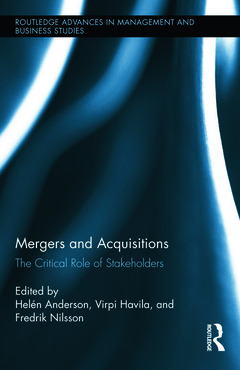Description
Mergers and Acquisitions
The Critical Role of Stakeholders
Routledge Advances in Management and Business Studies Series
Coordinators: Anderson Helén, Havila Virpi, Nilsson Fredrik
Language: English
Subjects for Mergers and Acquisitions:
Keywords
M&A; value creation; internal stakeholder; external stakeholder; ownership; actors; auditor; executive management; restructuring; Stockholms Enskilda Bank; Skandinaviska Banken; Local Integration Process; HSB; Sveriges Kreditbank; Public Administration; Atlas Copco; Part Number System; Svenska Handelsbanken; Swedish Competition Authority; Powerful External Stakeholders; Dagens Nyheter; Process Relational Perspective; Business Case; Marcus Wallenberg; Post-acquisition Performance; Bank Mergers; Swedish Commercial Banks; Central Government; High Failure Rates; Target Firm; Due Diligence Process; Risk Assessment Knowledge; Post-acquisition Phase; Respective Stakes
Support: Print on demand
Description
/li>Contents
/li>Readership
/li>Biography
/li>
A merger or acquisition is usually a challenging endeavor with a single ultimate aim: to create value for the owner. However, stakeholder theory shows how such a narrow and one-sided focus is detrimental to value-creation in general ? not only for other stakeholders within and outside the organization, but also for the owner. Especially in a merger or an acquisition, it is evident that there are many groups and individuals who have a stake in the success or failure of a business.
So far, the overwhelming majority of research in the field of mergers and acquisitions has focused on the merging organizations, and so researchers have mainly studied internal stakeholder groups, such as employees and managers. This book shows how different stakeholders, internal and external, may play a critical role during a merger or an acquisition process. The book builds on empirical examples that illustrate how various stakeholders play active roles throughout the different phases, and, thus, ultimately affect the outcome and the value formation process of the merger or the acquisition. There is still much debate on how and when to best measure the outcome of a merger or an acquisition. With its comprehensive focus on stakeholders, this volume explores why some mergers and acquisitions fail while others succeed.
1. Introduction: A Stakeholder Approach to Mergers and Acquisitions Helén Anderson, Virpi Havila and Fredrik NilssonPart I: Shareholders and Top Managers 2. The Growing Importance of Corporate Social Responsibility in Mergers and Acquisitions Tommy Borglund 3. Top Managers as Stakeholders, Their Motives and Sensemaking in a ‘Hostile’ Merger and Acquisition Process Mona EricsonPart II: Middle Managers and Employees 4. The Arranged Marriage Syndrome – Challenges to Subsidiary Managers during the Integration Process between Two Merging Multinational Companies Roger Schweizer 5. Internal Legitimacy for Change in Mergers and Acquisitions Magnus Frostenson 6. The Internal Auditor’s Involvement in Acquisitions Fredrik Nilsson, Nils-Göran Olve and Olof Arwinge 7. When the Integration of Management Control Systems Is At Stake – Experience From the Car Industry Peter BeuschPart III: Suppliers and Customers 8. Managing the Influence of External Competitive Change during Integration Svante Schriber 9. Supplier Relationships at Stake in Mergers and Acquisitions Johan Holtström 10. Why Do Customers Dissolve Their Business Relationships with the Acquired Party Following an Acquisition? Christina ÖbergPart IV: Public Bodies, Other Parties of Public Interest and Scholars 11. Mergers of Authorities in Central Government: Role Ambiguities and Blame-Avoidance Louise Bringselius 12. Bank Mergers in Sweden - The Interplay between Bank Owners, Bank Management and the State 1910-2009 SvenJungerhem and Mats Larsson 13. The Stake of High Failure Rates in Mergers and Acquisitions Annette Risberg 14. Epilogue: Reflection on the Critical Role of Stakeholders in Mergers and Acquisitions Helén Anderson
Helén Anderson is Professor of Business Administration at Jönköping International Business School, with a concentration in Marketing. Her research interests are in business dynamics, innovation, strategic change, and mergers and acquisitions.
Virpi Havila is Professor of Business Studies at the Department of Business Studies at Uppsala University, with a concentration in Industrial Marketing. Her research interests include mergers and acquisitions, project ending and effects of ending business-to-business relationships.
Fredrik Nilsson is Professor of Business Administration at Uppsala University with a concentration in Accounting. His research is focused on understanding the role of control systems in formulating and implementing strategies.



